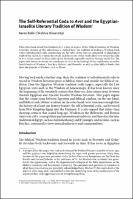Please use this identifier to cite or link to this item:
https://hdl.handle.net/20.500.12202/4436Full metadata record
| DC Field | Value | Language |
|---|---|---|
| dc.contributor.author | Koller, Aaron | - |
| dc.date.accessioned | 2019-06-27T15:03:28Z | - |
| dc.date.available | 2019-06-27T15:03:28Z | - |
| dc.date.issued | 2017-02 | - |
| dc.identifier.citation | Koller, Aaron. (2017). The Self-Referential Coda in the Mishnah and the Egyptian-Israelite Literary Tradition of Wisdom. Journal of Ancient Judaism 8(1), 2-25. | en_US |
| dc.identifier.issn | 1869-3296 | - |
| dc.identifier.uri | https://doi.org/10.13109/jaju.2017.8.1.2 | en_US |
| dc.identifier.uri | https://hdl.handle.net/20.500.12202/4436 | - |
| dc.description | Scholarly article Copyright permission: Rebecca Triller/ Vandenhoeck & Ruprecht 27June2019 | en_US |
| dc.description.abstract | It has often been noted that Mishnah Avot is heir to aspects of the biblical tradition of Wisdom. A further element of this inheritance is studied here: the tradition of ending a Wisdom book with a selfreferential coda, commenting on the value of the text just completed. A philological study of the end of Avot opens this study, and the results of that study allow us to situate the coda to Avot in the context of other codas in the Mishnah, especially tractates Neziqin and Kelim. The paper then moves to situate the conclusion to Avot in the heritage of the conclusions of earlier Jewish books of Wisdom – Ben Sira, Qohelet, and Proverbs, as well as other biblical books that show the imprint of Wisdom, such as Hosea. | en_US |
| dc.description.sponsorship | A proposal for this paper was read and critiqued by Richard Steiner a number of years ago, and his guidance was helpful in formulating the topic with greater precision. Since then, versions of the paper were presented at the Yeshiva University Symposium on the Dead Sea Scrolls and Ancient Judaism, at the invitation of Dr. Ari Mermelstein, to whom I am grateful for the opportunity, and at the departmental colloquia of the Bible departments of the Hebrew University and Ben Gurion University. The comments and questions of attendees at all of these presentations are gratefully acknowledged here. Michael V. Fox read a draft of the paper at a late stage, and I am indebted to him for identifying some of the weaker parts of the argument here and suggesting ways of strengthening them. | en_US |
| dc.language.iso | en_US | en_US |
| dc.publisher | Vandenhoeck & Ruprecht GmbH & Co. KG | en_US |
| dc.relation.ispartofseries | Journal of Ancient Judaism;8(1) | - |
| dc.rights | Attribution-NonCommercial-NoDerivs 3.0 United States | * |
| dc.rights.uri | http://creativecommons.org/licenses/by-nc-nd/3.0/us/ | * |
| dc.subject | Mishnah Avot | en_US |
| dc.subject | Egyptian-Israelite tradition of wisdom | en_US |
| dc.subject | self-referential codas | en_US |
| dc.subject | Wisdom literature | en_US |
| dc.subject | Proverbs | en_US |
| dc.subject | Kohelet | en_US |
| dc.subject | Ecclesiastes | en_US |
| dc.subject | Egyptian wisdom literature | en_US |
| dc.subject | middah | en_US |
| dc.subject | Amenemope | en_US |
| dc.subject | Qohelet | en_US |
| dc.subject | Demotic wisdom | en_US |
| dc.title | The Self-Referential Coda in the Mishnah and the Egyptian-Israelite Literary Tradition of Wisdom. | en_US |
| dc.type | Article | en_US |
| local.yu.facultypage | https://www.yu.edu/faculty/pages/koller-aaron | |
| Appears in Collections: | Yeshiva College: Faculty Publications | |
Files in This Item:
| File | Description | Size | Format | |
|---|---|---|---|---|
| Koller End of Avot and Egyptian Wisdom Literature JAJ 2018.pdf | PDF author | 266.72 kB | Adobe PDF |  View/Open |
This item is licensed under a Creative Commons License

